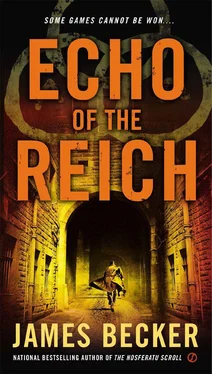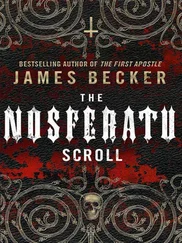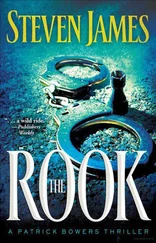James Becker - Echo of the Reich
Здесь есть возможность читать онлайн «James Becker - Echo of the Reich» весь текст электронной книги совершенно бесплатно (целиком полную версию без сокращений). В некоторых случаях можно слушать аудио, скачать через торрент в формате fb2 и присутствует краткое содержание. Жанр: Триллер, на английском языке. Описание произведения, (предисловие) а так же отзывы посетителей доступны на портале библиотеки ЛибКат.
- Название:Echo of the Reich
- Автор:
- Жанр:
- Год:неизвестен
- ISBN:нет данных
- Рейтинг книги:3 / 5. Голосов: 1
-
Избранное:Добавить в избранное
- Отзывы:
-
Ваша оценка:
- 60
- 1
- 2
- 3
- 4
- 5
Echo of the Reich: краткое содержание, описание и аннотация
Предлагаем к чтению аннотацию, описание, краткое содержание или предисловие (зависит от того, что написал сам автор книги «Echo of the Reich»). Если вы не нашли необходимую информацию о книге — напишите в комментариях, мы постараемся отыскать её.
Echo of the Reich — читать онлайн бесплатно полную книгу (весь текст) целиком
Ниже представлен текст книги, разбитый по страницам. Система сохранения места последней прочитанной страницы, позволяет с удобством читать онлайн бесплатно книгу «Echo of the Reich», без необходимости каждый раз заново искать на чём Вы остановились. Поставьте закладку, и сможете в любой момент перейти на страницу, на которой закончили чтение.
Интервал:
Закладка:
The second man waited until the car had driven out of the garage before again using the remote to close the doors. As he did so, he looked back at Bronson and gestured for him to replace the heavily tinted sunglasses over his eyes. They were clearly much more relaxed about their security now that he had been fatally compromised by Polti’s execution. They knew that he daren’t approach the authorities to inform on them-if that was his intention-because of the consequences to him personally if he did.
Bronson nodded agreement, removed the glasses from his pocket and put them on, because as before he had no other choice. But he’d already taken a long look around him as the car had pulled out of the garage. Lights were shining in various windows, and there was still enough natural light for him to get a good idea of the appearance of the property. The house looked smaller from the outside than the interior had suggested, but it was still obviously a substantial building.
The double garage doors were set in the lowest level of the structure, a few feet below ground level, and were approached by a well-tended gravel drive. These doors appeared to form the only opening to the house on that level, at least as far as Bronson could see, and it looked as if most of the lower-ground-floor area was given over to garaging, so presumably the occupants and their guests tended to arrive by car rather than on foot. Bronson guessed that there would be other entrances at ground level on the back or sides of the building, and he could see a wide veranda on the level directly above the garage, with a half-glazed door set in its center.
The property rose for two stories, probably built of brick, though the white painted walls made it impossible to be certain, under a roof that was notable for its shallow pitch and wide overhang at the eaves, clearly intended to cope with the heavy snowfalls the area experienced every winter. All the windows Bronson could see were fitted with shutters stained light brown to match the beams and trusses of the roof. It looked, in short, much like many of the other large houses he’d seen since entering Germany.
But in the few brief seconds before he’d been told to replace the sunglasses, Bronson had committed the appearance of the house to his memory, because knowing where to find the place again was now his highest priority. He had not the slightest intention of just trotting obediently back to London, as Marcus had told him to do. He believed that if he could find his way back, there was at least a chance that he could break in somehow and find what he needed.
And unlike the meeting places chosen by Georg in and around London, the house he’d just left was clearly a permanent residence for at least some of the people in the group-the room that had been used for the torture and execution of the unfortunate Polti demonstrated that clearly enough.
The last-and perhaps the most important-part of the puzzle was to find a street name or some indication of the district or town where the property was located, and Bronson hoped he would be able to do that as the car drove away, simply because he was sitting by himself in the backseat.
He had put on the sunglasses, as he’d been ordered, but as he’d done so he’d snapped off a tiny section of the plastic lens on the left-hand side, which gave him a small but usable window on the steadily darkening world outside the car.
The BMW drove slowly over the gravel and then crossed rougher ground before coming to a halt between a pair of stone gateposts. He heard the sound of an approaching vehicle-a car or small van, he guessed-which passed directly in front of the car and then continued on its way. As soon as it had passed, the BMW accelerated across the road and turned left.
Through the tiny gap that he had created in the lens of the sunglasses, Bronson tried to take note of the terrain the vehicle was passing. He had hoped he might see a street sign or something else that would positively identify the location, but the car seemed to be driving along a fairly straight but narrow country road bordered, at least on the left-hand side, by woods and without any turnings or junctions as far as he could see. That single fact would help him find the house again, but only after he’d somehow managed to identify the district where it was located, and for that a road sign, a road number, or a village name-something concrete that he could remember-was essential.
The car had picked up speed, and Bronson guessed it was traveling at fifty or sixty miles an hour as the road continued straight. Just over four minutes after turning onto the road, he felt the BMW begin to slow down, the driver shifting down two gears as he applied the brakes, and then the vehicle steered to the left at a Y-junction.
Without appearing to do so, Bronson shifted his gaze and just caught a glimpse of a small sign that presumably indicated the name of the road the car had turned into. It was too dark for him to read the entire name, but he did see-and, more important, he made sure he remembered-the first part of the word: “ Kaupt.” And he couldn’t swear to it, but he thought the second part of the name was the German word for street: stra?e or strasse.
A few seconds after it had turned onto the other road, the car drove past a group of buildings on the left-hand side. At first sight Bronson thought it might be a farm, but then changed his mind because, through his very restricted aperture, it looked more like a small estate of upmarket houses, though it could also, he supposed, have been a small industrial park. He was having to use only his peripheral vision and that, along with the fading light, made discerning anything clearly very difficult.
A few moments later, the car again slowed down almost to a crawl but continued moving in a straight line, and it was soon obvious that the BMW was joining a major road. Bronson could hear the sound of other vehicles passing in both directions in front of them before the car pulled out onto the road. The driver swung left to cross the lane handling opposite-direction traffic, and then to the left, to continue in more or less the same direction that he’d been driving before.
Then Bronson had a stroke of luck as the car drove onto a bridge that spanned either a river or a canal, most probably the latter because the waterway seemed to have a very consistent width. That was an identification feature that should help narrow his search markedly. And almost before that thought had fully registered, the car slowed again as it entered a built-up area.
Bronson vainly searched for a village name, but saw nothing useful. The road appeared to continue more or less straight, but then he felt the car enter a sweeping curve to the left and a few seconds later begin a turn to the right that was almost as sharp. Moments after that, they were back in the open countryside. He didn’t know how many villages or suburbs there were around Berlin that were near a canal and that had a main road running through them with an S-bend in the middle, but he hoped there wouldn’t be too many.
He continued trying to build a picture of the remainder of the journey, but within a few minutes of leaving the village, the car turned onto an autobahn that was, like most German main roads, devoid of unusual features. So Bronson just concentrated on making sure that what he had seen remained locked in his memory.
When the car finally turned off the autobahn, he guessed he was near his journey’s end, and a couple of minutes later the BMW drew to a halt.
“You can get out now,” the driver said, his English heavily accented.
Bronson nodded, took the sunglasses off his face and reached for the door handle. As he stepped out of the car, he recognized the station car park once again, and saw his Hyundai parked a few yards away. He didn’t look back, just strode across to his car, feeling in his pocket for the keys, and when he did finally glance behind him, he saw the BMW driving away from him toward the exit.
Читать дальшеИнтервал:
Закладка:
Похожие книги на «Echo of the Reich»
Представляем Вашему вниманию похожие книги на «Echo of the Reich» списком для выбора. Мы отобрали схожую по названию и смыслу литературу в надежде предоставить читателям больше вариантов отыскать новые, интересные, ещё непрочитанные произведения.
Обсуждение, отзывы о книге «Echo of the Reich» и просто собственные мнения читателей. Оставьте ваши комментарии, напишите, что Вы думаете о произведении, его смысле или главных героях. Укажите что конкретно понравилось, а что нет, и почему Вы так считаете.












